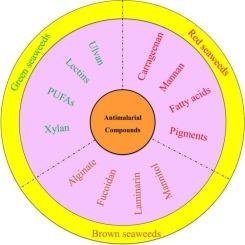Polysaccharides and flavonoids from seaweeds: A natural arsenal against drug-resistant malaria
IF 4
2区 农林科学
Q2 FOOD SCIENCE & TECHNOLOGY
引用次数: 0
Abstract
Seaweed, a rich source of bioactive compounds, has garnered attention for its potential antimalarial properties, particularly through the action of polysaccharides and flavonoids. This review explores the mechanisms by which these compounds inhibit the growth of Plasmodium parasites, responsible for malaria. Sulfated polysaccharides, especially fucoidan derived from brown seaweeds, have demonstrated significant antimalarial activity by preventing the invasion of erythrocytes and suppressing parasite growth. Additionally, polysaccharides from various seaweed species, such as Sargassum and Gracilaria, have shown the capacity to enhance the immune response. Flavonoids, known for their antioxidant and anti-inflammatory properties, also exhibit antiplasmodial activity through mechanisms that may include interference with the parasite's life cycle. The review emphasizes the importance of extraction methods on the bioactivity of these compounds and discusses their potential as therapeutic agents against malaria. While promising, developing seaweed-derived antimalarial compounds faces challenges requiring further research to elucidate their mechanisms and optimize their efficacy.

海藻中的多糖和类黄酮:抵抗抗药性疟疾的天然武器
海藻是生物活性化合物的丰富来源,因其潜在的抗疟疾特性,特别是通过多糖和类黄酮的作用而引起了人们的关注。本综述探讨了这些化合物抑制导致疟疾的疟原虫生长的机制。硫酸酸化多糖,特别是从褐海藻中提取的岩藻聚糖,通过防止红细胞入侵和抑制寄生虫生长而显示出显著的抗疟疾活性。此外,来自各种海藻的多糖,如马尾藻和葛尾草,已经显示出增强免疫反应的能力。黄酮类化合物,以其抗氧化和抗炎特性而闻名,也表现出抗疟原虫活性,其机制可能包括干扰寄生虫的生命周期。本文强调了提取方法对这些化合物生物活性的重要性,并讨论了它们作为疟疾治疗剂的潜力。开发海藻衍生的抗疟疾化合物虽然前景光明,但面临着需要进一步研究以阐明其机制并优化其功效的挑战。
本文章由计算机程序翻译,如有差异,请以英文原文为准。
求助全文
约1分钟内获得全文
求助全文
来源期刊

Journal of Functional Foods
FOOD SCIENCE & TECHNOLOGY-
CiteScore
9.60
自引率
1.80%
发文量
428
审稿时长
76 days
期刊介绍:
Journal of Functional Foods continues with the same aims and scope, editorial team, submission system and rigorous peer review. We give authors the possibility to publish their top-quality papers in a well-established leading journal in the food and nutrition fields. The Journal will keep its rigorous criteria to screen high impact research addressing relevant scientific topics and performed by sound methodologies.
The Journal of Functional Foods aims to bring together the results of fundamental and applied research into healthy foods and biologically active food ingredients.
The Journal is centered in the specific area at the boundaries among food technology, nutrition and health welcoming papers having a good interdisciplinary approach. The Journal will cover the fields of plant bioactives; dietary fibre, probiotics; functional lipids; bioactive peptides; vitamins, minerals and botanicals and other dietary supplements. Nutritional and technological aspects related to the development of functional foods and beverages are of core interest to the journal. Experimental works dealing with food digestion, bioavailability of food bioactives and on the mechanisms by which foods and their components are able to modulate physiological parameters connected with disease prevention are of particular interest as well as those dealing with personalized nutrition and nutritional needs in pathological subjects.
 求助内容:
求助内容: 应助结果提醒方式:
应助结果提醒方式:


